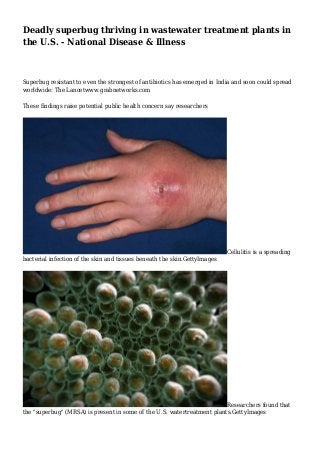
Deadly superbug thriving in wastewater treatment plants in the U.S. - National Disease & Illness
- 1. Deadly superbug thriving in wastewater treatment plants in the U.S. - National Disease & Illness Superbug resistant to even the strongest of antibiotics has emerged in India and soon could spread worldwide: The Lancetwww.grabnetworks.com These findings raise potential public health concern say researchers Cellulitis is a spreading bacterial infection of the skin and tissues beneath the skin.GettyImages Researchers found that the "superbug" (MRSA) is present in some of the U.S. watertreatment plants.GettyImages
- 2. Methicillin-resistant Staphylococcus aureus (MRSA) is a bacterium responsible for several difficult-to- treat infections in humans and is well known to its difficulty to treat due to its resistance to beta-lactam antibiotics that include penicillin's and the cephalosporins such as Cephalexin. It has been affecting people in hospitals and communities since the late 1900'S. In 1999, a report showed that MRSA infections reached 127,000 in 1999, with as many as 11,000 people dying from the deadly Superbug, according to the CDC. The incidence of of community-acquired methicillin-resistant Staphylococcus aureus (CA-MRSA) infections is increasing in the United States, according to the studies abstract. Dr. Amy R. Sapkota, PhD, assistant professor in the Maryland Institute for Applied Environmental Health and lead researcher stated "we still do not fully understand the potential environmental sources of MRSA or how people in the community come in contact with this microorganism." "This was the first study to investigate U.S. wastewater as a potential environmental reservoir of MRSA." Because infected people can shed MRSA from their noses and skin and through their feces, wastewater treatment plants are a likely reservoir for the bacteria. Swedish researchers have previously identified the presence of MRSA in WWTPs in Sweden, and this new UMD-led study confirms the presence of MRSA in U.S. facilities. The research team collected wasteÂwater samples from two Mid-Atlantic and two Midwest wasteÂ-water treatment plants between October 2009 and October 2010. These plants were in part chosen due to treated effluent (reclaimed water produced by wastewater treatment plant) is reused new orleans flood pumps as "reclaimed wastewater" in spray irrigation activities. The research team was interested in finding whether MRSA remained in the effluent. Samples were analyzed for MRSA and MSSA using membrane filtration (a technique which is used to separate particles from a liquid for the purpose of purifying it). Isolates were confirmed using biochemical tests and PCR (polymerase chain reaction) and Antimicrobial susceptibility testing was performed by Sensititre® microÂbroth dilution. PLV screening and PFGE were done to further identify the strains. The researchers found MRSA in 50% of the samples and MSSA in 55% of the wastewater samples. Only one waste water treatment plant had the bacteria in the treated water leaving the plant and this was at a plant that does not regularly use chlorination, a tertiary step in wastewater treatment.
- 3. Among the MRSA strains 93% that were isolated from wastewater and 29% of MSSA were resistant to two or more classes of antibiotics which had included several that the FDA had specifically approved to treat MRSA infections. The researchers write in their conclusion "our findings raise potential public health concerns for wasteÂ-water treatment plant workers and individuals exposed to reclaimed wasteÂwater. Because of increasing use of reclaimed wasteÂwater, further study is needed to evaluate the risk of exposure to antibiotic-resistant bacteria in treated wasteÂ-water." The research team included University of Maryland School of Public Health and University of Nebraska Medical Center researchers. This study appears in the journal Environmental Health Perspectives. According to the FDA bacteria becomes resistant to antibiotics by these common causes: Using antibiotics for illnesses that aren't caused by bacteria. Some patients have asked their doctors for antibiotics to treat viral infections such as colds and the flu. Viral infections do not respond to antibiotics. Giving antibiotics to food-producing animals such as cattle, chickens, and pigs. These drugs are given to animals not only for health reasons, but also to increase production. Failing to take antibiotics as directed. Some people stop taking an antibiotic as soon as they feel better, instead of completing the full dose. For more information on recognizing and preventing MRSA infections can be viewed online at the Centers for Disease Control and Prevention website.